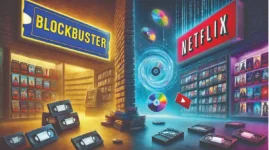Crocodiles hunt with patience and strike with amazing power. Yet after a big meal, these scary predators let down their guard. They become easy targets because they feel safe and full. The same thing happens to many companies right after they hit it big.
Success feels great but can hurt businesses that stop paying attention. Companies often think they have made it to the top forever. They stop looking for new ideas and miss when the world changes around them. The quiet danger of feeling satisfied kills any chance for growth.
Remember Blockbuster? They ruled video rentals with thousands of stores everywhere. When Netflix started mailing DVDs, Blockbuster laughed it off as unimportant. They kept doing things the old way because it worked before. By the time Netflix started streaming, Blockbuster had already fallen behind and went bankrupt.
Businesses show clear warning signs before they fail to feel satisfied. They fight against new ideas because change seems scary. They create excuses about why updates can take forever. You hear people say things like, "We always did it this way," instead of trying better methods.
The need for speed disappears when companies think they can coast forever. Important choices get pushed off until tomorrow. Workers settle into easy routines instead of pushing forward. Projects drag on past deadlines. All these problems happened at Blockbuster as Netflix zoomed ahead.
Companies that stop listening to customers almost always crash. They assume people want the same things forever, and clients feel ignored and leave. Products become outdated quickly. Kodak made this mistake by ignoring digital cameras until its film business became worthless.
Success makes people think they know everything. Leaders make bad choices based on old information. They stop watching what competitors do. They miss real threats because past wins cloud their judgment. BlackBerry refused to believe touchscreens would replace keyboards until Apple and Android took all their customers.
Workers hate showing up at places that never change or improve. They feel stuck and have no chance to grow. Smart employees leave for better opportunities elsewhere. The rest just follow orders without trying anything new, draining energy from the entire organization.
All these problems connect and make each other worse. Fighting change leads to slowness. Slowness means missing what customers want. Overconfidence blinds leaders to real dangers. Bored workers cannot create new solutions. The company slides backward before anyone notices.
Smart businesses avoid these traps through constant action. They create places where fresh thinking gets rewarded. They set tough goals with real deadlines. They talk directly with customers about changing needs. They stay humble despite success. They help employees learn new skills and recognize good work.
Companies must remember success never lasts without effort. Those who keep adapting survive much longer than those who rest after winning. Staying hungry prevents complacency from taking root. The businesses that last longest never stop moving forward, even after major achievements.
Success feels great but can hurt businesses that stop paying attention. Companies often think they have made it to the top forever. They stop looking for new ideas and miss when the world changes around them. The quiet danger of feeling satisfied kills any chance for growth.
Remember Blockbuster? They ruled video rentals with thousands of stores everywhere. When Netflix started mailing DVDs, Blockbuster laughed it off as unimportant. They kept doing things the old way because it worked before. By the time Netflix started streaming, Blockbuster had already fallen behind and went bankrupt.
Businesses show clear warning signs before they fail to feel satisfied. They fight against new ideas because change seems scary. They create excuses about why updates can take forever. You hear people say things like, "We always did it this way," instead of trying better methods.
The need for speed disappears when companies think they can coast forever. Important choices get pushed off until tomorrow. Workers settle into easy routines instead of pushing forward. Projects drag on past deadlines. All these problems happened at Blockbuster as Netflix zoomed ahead.
Companies that stop listening to customers almost always crash. They assume people want the same things forever, and clients feel ignored and leave. Products become outdated quickly. Kodak made this mistake by ignoring digital cameras until its film business became worthless.
Success makes people think they know everything. Leaders make bad choices based on old information. They stop watching what competitors do. They miss real threats because past wins cloud their judgment. BlackBerry refused to believe touchscreens would replace keyboards until Apple and Android took all their customers.
Workers hate showing up at places that never change or improve. They feel stuck and have no chance to grow. Smart employees leave for better opportunities elsewhere. The rest just follow orders without trying anything new, draining energy from the entire organization.
All these problems connect and make each other worse. Fighting change leads to slowness. Slowness means missing what customers want. Overconfidence blinds leaders to real dangers. Bored workers cannot create new solutions. The company slides backward before anyone notices.
Smart businesses avoid these traps through constant action. They create places where fresh thinking gets rewarded. They set tough goals with real deadlines. They talk directly with customers about changing needs. They stay humble despite success. They help employees learn new skills and recognize good work.
Companies must remember success never lasts without effort. Those who keep adapting survive much longer than those who rest after winning. Staying hungry prevents complacency from taking root. The businesses that last longest never stop moving forward, even after major achievements.












